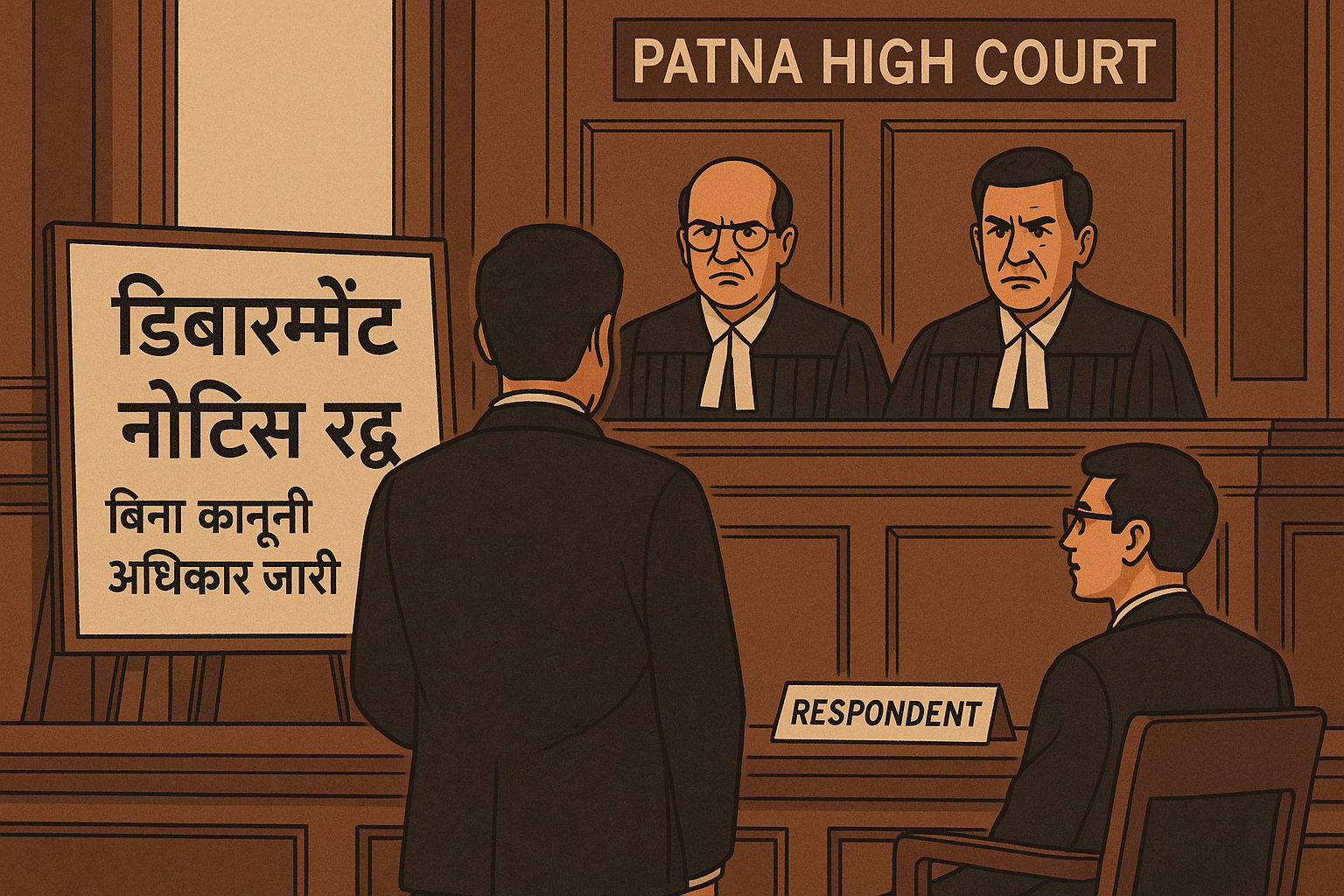\Simplified Explanation of the Judgment
The Patna High Court recently ruled in favor of a construction company that had challenged a notice threatening debarment from future government contracts. The dispute involved a road construction project under the Rural Works Department of Bihar. The petitioner — a registered construction firm — was issued a show-cause notice on 11.07.2023, asking why it should not be declared a defaulter and debarred from future tenders for failure to complete a road project (Agreement No. 65/2019-20).
The company responded by filing a writ petition arguing that:
- The Engineer-in-Chief, who issued the notice, had no legal authority to impose debarment.
- The notice was contrary to the terms of the construction agreement and violated established rules.
- The Bihar Registration of Contractors Rules, 2007, which govern actions like blacklisting and suspension, do not recognize debarment as a valid action.
Importantly, the contractor did not dispute the issuance of a show-cause notice per se, but challenged its validity on the ground that there was no statutory power or legal rule under which such a debarment could be imposed.
The Court referred to established legal principles from two Supreme Court judgments:
- Union of India v. Kunisetty Satyanarayana, (2006) 12 SCC 28
- Ministry of Defence v. Prabhash Chandra Mirdha, (2012) 11 SCC 565
According to these rulings, courts generally do not interfere with show-cause notices unless they are issued:
- By a legally incompetent authority, or
- In violation of existing statutory provisions.
In this case, the Court found that:
- The Engineer-in-Chief had no statutory power to issue a debarment notice.
- The 2007 Contractor Registration Rules only mention blacklisting or suspension, not debarment.
Based on this, the Court quashed the show-cause notice dated 11.07.2023 and gave liberty to the government to initiate proceedings afresh, if done under a valid legal framework.
Significance or Implication of the Judgment
This judgment has wide-reaching implications, particularly in the field of government contracting and administrative law:
- For Contractors: It offers reassurance that government cannot arbitrarily threaten debarment without adhering to statutory rules and procedures. It reaffirms that legal safeguards are available even at the stage of a show-cause notice if the notice itself is unlawful.
- For Government Departments: The decision acts as a strong reminder that disciplinary actions like debarment, blacklisting, or suspension must be grounded in statutory authority. Departmental officers cannot create or assume powers not granted by law.
- For the Legal System: The judgment reinforces the importance of administrative fairness and jurisdiction. Even preliminary notices must conform to existing laws.
Legal Issue(s) Decided and the Court’s Decision with reasoning
- Can the Engineer-in-Chief issue a debarment notice without legal authority?
- Court’s Decision: No. The Court held that the officer acted beyond his jurisdiction and without any legal basis.
- Does Rule 11 of the Bihar Registration of Contractors Rules, 2007 authorize debarment?
- Court’s Decision: No. The Rules provide only for blacklisting or suspension — not debarment.
- Was the writ petition maintainable at the stage of show-cause notice?
- Court’s Decision: Yes. Since the notice lacked legal authority, it could be challenged even at this preliminary stage.
- What directions were issued to the government?
- Court’s Direction: The government may proceed again, but only under valid laws and rules applicable to the contractor’s case, and within 3 months.
Judgments Relied Upon or Cited by Court
- Union of India and Another v. Kunisetty Satyanarayana, (2006) 12 SCC 28
- Secretary, Ministry of Defence v. Prabhash Chandra Mirdha, (2012) 11 SCC 565
Case Title
Vijay Raj Mewar Construction Company Pvt. Ltd. v. State of Bihar & Ors.
Case Number
Civil Writ Jurisdiction Case No. 14521 of 2023
Coram and Names of Judges
Hon’ble Mr. Justice P. B. Bajanthri
Hon’ble Mr. Justice Ramesh Chand Malviya
Names of Advocates and who they appeared for
Mr. Prabhat Ranjan, Mr. Chandan Kumar, Mr. Ansh Prasad, Mr. Sukarn Gop — for the Petitioner
Mr. Anjani Kumar (AAG 4), Mr. Deepak Sahay Jamvar (AC to AAG 4) — for the Respondents
Link to Judgment
If you found this explanation helpful and wish to stay informed about how legal developments may affect your rights in Bihar, you may consider following Samvida Law Associates for more updates.








